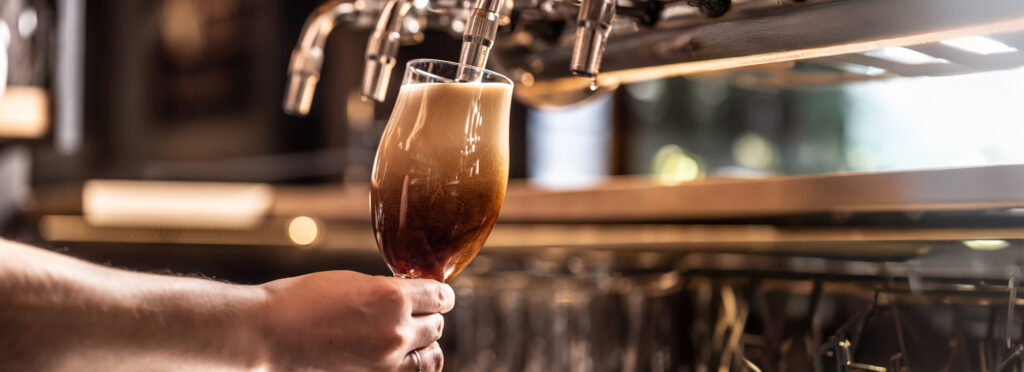It’s the 16th of June, 2016, and I’m idly starting out of a window while on board a commuter train travelling from Leeds to Huddersfield. I remember the date well because it’s the day England beat Wales 2 – 1 in the group stage of that summer’s European Championships. I’m on my way to visit Magic Rock brewery, which back then had recently relocated to a brand new facility with a purpose built taproom – one of the first of its kind in the UK and a huge upgrade from the far smaller facility where its story began in 2011.

Although I was there to engage with the brewery as a professional journalist, I was finding it difficult to contain my excitement. It was only four months since I had quit my job to have a crack at the beer writing game full-time and I was still very much in the nascent, enthusiast stage of my career. I was on-assignment, commissioned to write an in-depth profile of this brewery for American beer website Good Beer Hunting, and I wanted to make it a good one. After a bit of an internal battle, I eventually managed to calm down a little.
On arrival I was collected from Huddersfield station by the brewery’s founder, Richard Burhouse. After a whistle stop tour of its original facility, plus the wholesale semi-precious stone company established by Richard’s family from which the brewery takes its name, we arrived at the new facility. When we did, my jaw dropped. It was as if they’d airlifted in a couple of hundred square feet of brewery taproom from San Diego and deposited in West Yorkshire. At the time it was everything I had hoped British beer would embrace, as its newest breweries sought an identity of their own, away from what I considered to be the stuffy side of traditional British beer. (Oh how times have changed.)
And the beer. Oh my god, the beer. If you were there at the time I don’t need to tell you how good it was. But it was superb. Led by then head brewer Stuart Ross, the IPAs were resinous and precise, the barrel-aged stouts unctious and indulgent, the gose — well, that was something I’d never even tried before by this point. They were truly special, and it felt like they were doing something that few other breweries in the UK were at this point in time.
Yes, Magic Rock was, well, magical. So when it was announced at the start of January 2025 that it was to appoint administrators, my heart sank. Despite it feeling like there was a certain inevitability to it, this was, in my eyes, the demise of one of modern British beer’s great originators. Since Burhouse decided to sell the brewery to Japanese-owned conglomerate Lion in 2019 it feels like the brand has been involved in a rather detrimental game of pass the parcel. Lion abandoned the brewery, along with its other acquisition, Fourpure, just two years later. The company then became part of something called Odyssey Inns, and then something called In Good Company. Who will take it on now is anyone’s guess, but I suspect that someone or something will hover in and sweep up the brand and its assets on the cheap pretty quickly.
You could argue that Magic Rock’s beer hasn’t been what it was for a few years now (I’d agree.) I also consider its focus on stacking it high and selling it cheap in supermarkets pulled it away from the on-trade where it previously made most of its impact. More than anything though, its potential erasure from the UK brewing landscape feels like a line in the sand – a whimpering end to that buoyant, exciting beer-era that felt so vital to many of us at the time.
Some of the best breweries of this period have survived, of course. The Kernel in London, RedWillow in Macclesfield… I could go on and on. Good beer isn’t going anywhere, but over the past five years we’ve seen a decline in both the number of independent breweries in the UK, and the enthusiasm that made us feel so positive about them in the first place. Is this simply part of the inevitable cycle any fandom creates? A classic tale of boom and bust? Or were we all simply too naive to understand that any market has its saturation point, and in terms of the number of breweries and beers available in the UK, we blew past that a long, long time ago…

The timing of Magic Rock’s emergence in 2011 was no coincidence. It was a hugely positive moment in history for British brewing. A series of events had converged, creating a butterfly effect that would see the net number of breweries nearly triple from what they were at the start of the 21st century. It began in 2002 when then Labour chancellor Gordon Brown introduced Progressive Beer Duty (PBR – sometimes referred to as Small Brewers Relief, or SBR) which meant that breweries under a certain threshold would pay up to 50% less duty on the beer they produced than their largest competitors.
At the same time the US brewing industry was recovering from a 1990s-era slump and was seeing a new wave of producers emerge, largely inspired by the survivors of said downturn, including Sierra Nevada, Anchor, Goose Island, Deschutes and many more. Often referred to as the ‘Craft Beer Revolution’ it represented a total cultural shift in terms of beer and brewing in North America. Now home to more than 10,000 breweries, it’s currently reeling from a saturation crisis of its own. But in the early 2000’s the very existence of these breweries was creating a stir that would inspire copycats the world over, and nowhere more so than in the UK.
In 2002 there were about 700 brewing businesses registered in the UK via HMRC. 10 years later this had increased slowly and sensibly to about 1200. By 2017, however, data firm Hacker Young reported that number had surpassed 2000 and showed no signs of slowing down. If the market was becoming oversaturated, we either decided not to notice, or not to care. Nature, however, did not care for our ambivalence. When the Covid-19 pandemic reared its head at the start of 2020, it shone light into the deep dark cracks that had been left in the wake of British Beer’s rapid and largely unchecked expansion.
There’s no denying that the 2010’s were a wonderful time in beer and brewing. If you were there, you couldn’t help but get caught up in the excitement, and neither could many of the breweries involved. As a result of the market’s apparent buoyancy, many breweries leveraged huge amounts of debt to expand their operations, convinced that more people wanted more beer, and that “craft beer” deserved to be mainstream. Back then I would have agreed with you. Now? I think we were too optimistic. This kind of beer deserves to exist in a healthily-sized niche. But it never had the legs to go mainstream.
Brewery numbers in the UK have been in decline since 2020, and have settled at around 1815 according to industry body SIBA – although if you ask me, the numbers are less than that as many will still be registered on HMRC despite having ceased trading. That’s still more than twice the number of 20 years ago, and more significantly than this there is now a much wider variety of beer now available, as many new breweries attempt to hold consumer attention with a constant stream of new releases. This ultimately means that competition for shelf and tap space is now fiercer than ever. Choice and the resulting level of competition is undeniably a good thing, because the sign of a healthy market is one that offers consumers a wide choice, drives quality, and a range of price points to suit every budget.
Which brings me to the elephant in the room – access to market. Up to this point it has been relatively simple to build an argument to say there were too many breweries, and too much beer. The real issue however, which is exposing the fallibility of the independent beer market, is that those 1800-or-so breweries are scrabbling around for scraps, while most of the access to it is controlled by a handful of major conglomerates. Around 82% of the UK beer market is controlled by just seven companies: AB InBev, Heineken, Molson Coors, Carlsberg, Asahi, San Miguel Mahou and Diageo.
Cast your mind back to 2018-2019, and you may remember a brief period when the UK’s largest supermarket chain, Tesco, began stocking limited amounts of independent beer from small producers. This seemed like a big win for brewers and drinkers alike: a wide range of choice at supermarket prices, and the breweries getting paid fairly for large orders of their beer. However, despite wild enthusiasm from beer fans that saw them driving cross country to bag specific beers, the mainstream UK drinker simply wasn’t ready for this amount of choice, and to be honest, probably never will be.

Thousands of cans idled on the shelf, eventually being added to “whoops-aisle” discount deals to move stock, with many of these large scale contracts lasting no more than six months. It nearly put several of these breweries out of business, and those that were able to survive then had to immediately face the onslaught of lockdown, and the pandemic. That supermarket shelf space now belongs only to the breweries who were able to muster the scale and substance to survive within it (and several of those, like Magic Rock, had been acquired by larger breweries anyway, giving them the necessary knowledge and leverage to exist within this space.)
I actually think that there is more than enough room for the UK’s 1800-or-so independent breweries, but the issue is that most of this room is being manipulated by their larger rivals to their disadvantage. We presently exist in a system where a pub could be less than a mile from a local brewery, but if that pub, or its dispense equipment is owned or maintained by one of these giant competitors, then it can’t buy it. Does that sound like a fair and open market to you? Let’s not beat around the bush here: it isn’t.
To see how bad this could become for UK independents, you only need to look at Ireland (including Northern Ireland) as a case study. Here, in the most tied and controlled beer market in the world, there are only 90 breweries. Per capita that is not far off the same ratio as somewhere like London or Manchester, but once you factor in things like export and tourism, it simply doesn’t make sense. It is a deliberate limitation of consumer choice by market coercion, and it’s not going to change any time soon.
There is a storm coming for independent breweries unless legislation is introduced that lets them compete in a market in which the scales are unfairly tipped against them. The beer market was never oversaturated in the first place, it is simply flawed by design, forcing its smallest players to either go along with the system that’s against them, or fail.
— Matthew Curtis